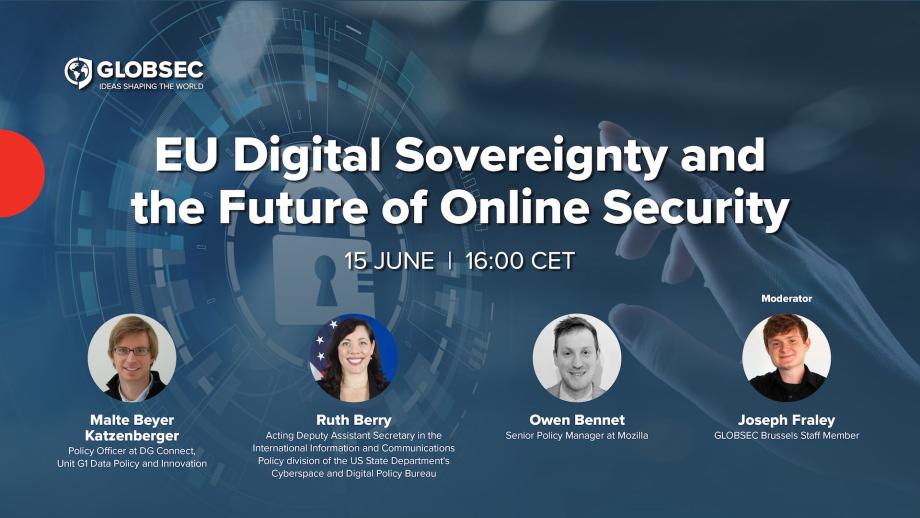Webinar: EU Digital sovereignty and the Future of Transatlantic Cooperation on Data Governance

In February, the European Commission presented its proposal for a fair and innovative data economy called the Data Act. The Data Act consists of rules on who can use and access what data for which purpose across all economic sectors in the EU (to equalize large and small int users/providers possibilities).
- Wednesday, June 15th from 4:00-5:00pm CEST (10am-11am EST.)
In other words, the goal is to make sharing, use and reuse of data available to all equally by having EU-wide standards. The Data Act is the next piece in the Commission’s digital legislation efforts along the already well-known DMA and DSA files.
The possibility of sharing data in the EU single market brings great advantages to everyday life and business-related engagement. However, with the increasing number of intra EU cross border transactions, there is an increased risk on data security as well. Citizens experience the advantages of the EU single market more and more every day, subsequently they expect sensitive personal data should be protected everywhere in the EU. In this regard, the now under evaluation eIDAS Regulation is a key enabler for secure cross-border transactions. While these advantages are clear and even needed, they cannot come at the price of unnecessary cybersecurity risks.
The US and EU should focus on a shared set of values to define the digital policy space. Digital policies on both sides of the Atlantic should be consistent with the transatlantic principles and checked against security risks. Furthermore, the security angle should not only be seen from one direction, but a multidisciplinary approach is also needed to tackle the wide variety of concerns that are present in both the EU and US. The Technology and Trade Council (TTC) provides an opportunity to build the aforementioned shared set of values. The EU and the US should use this platform to jumpstart deeper cooperation and set standards in the realm of tech policy.
In this regard, three questions are important to ask.
- What is needed to intensify transatlantic collaboration on tech policy?
- How can we balance the geographically fragmented jurisdictions with the reality of a transatlantic digital society?
- How can we balance the interests of the business interest groups and the European/American citizen?
Speakers:
- Malte Beyer-Katzenberger: DG Connect, Unit G1 Data Policy and Innovation
- Owen Bennett: Senior policy manager, Mozilla
- Ruth Berry---Acting Deputy Assistant Secretary in the International Information and Communications Policy division of the US State Department's Cyberspace and Digital Policy
Led by: Joseph Fraley, GLOBSEC Brussels staff member
You can watch the webinar here, or read the key takeaways below:
Key Takeaways:
- The TTC ensures that approaches to trade and technology are complementary and that physical and digital markets are interconnected.
- The framework has also helped enable an unprecedented unified transatlantic response on sanctions and exports controls to be applied on day one of Putin’s war on Ukraine.
- We must ensure that we cooperate in a way that addresses harm but does not stifle innovation
- A key element of the TTC negotiations that is gaining traction is the agreement in principle to renew the privacy shield
- Some aspects of tech policy won’t be easily compatible due to differences in mindsets and legal systems but we need to make sure that they at the very least are not in conflict with one another
- Although companies often have their own privacy and protection regulations, individual companies can only do so much. That is why government intervention is needed.
- There is transatlantic cooperation on figuring out how private sector databases could be used for public benefit, such as using evidence-based data in combating the effects of climate change.
- The US and the EU have a shared understanding of what the goals are on tech policy, but they don’t always share the same approaches and that often simply comes down to legal differences.
- Sometimes the most difficult topics to find channels of cooperation on are issues that the European Court of Justice has ruled on because there is very little leeway that the Commission and the US can work with.
- More efficient transatlantic data flows can help prepare for critical materials or supply chain disruptions.
- Companies like Mozilla are often afraid of the global precedents that large interventions by the US and EU might set in the government collection of private data as interventions may have unintended consequences, potentially benefitting autocracies.
- The EU Commission is farther ahead in terms of legislating on some of the challenges posed by large online platforms and market concentration compared to the US, but the US is actively looking at how to catch up, whether through legislation or federal regulations.
- There is often a distrust from governments and public interest firms when private companies use security concerns as a reason not to cooperate with other firms or with governments, although these concerns are sometimes valid.
- To the US, multistakeholder approaches are important to ensure that there is an innovative environment that still has the necessary checks and balances.